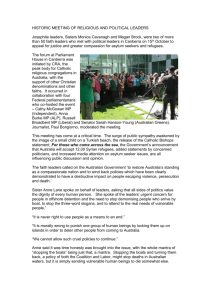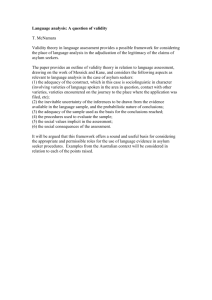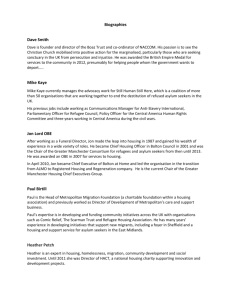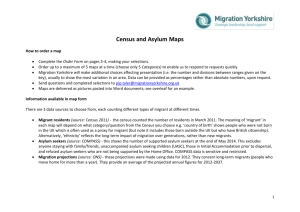20121217_migration_amendment
advertisement
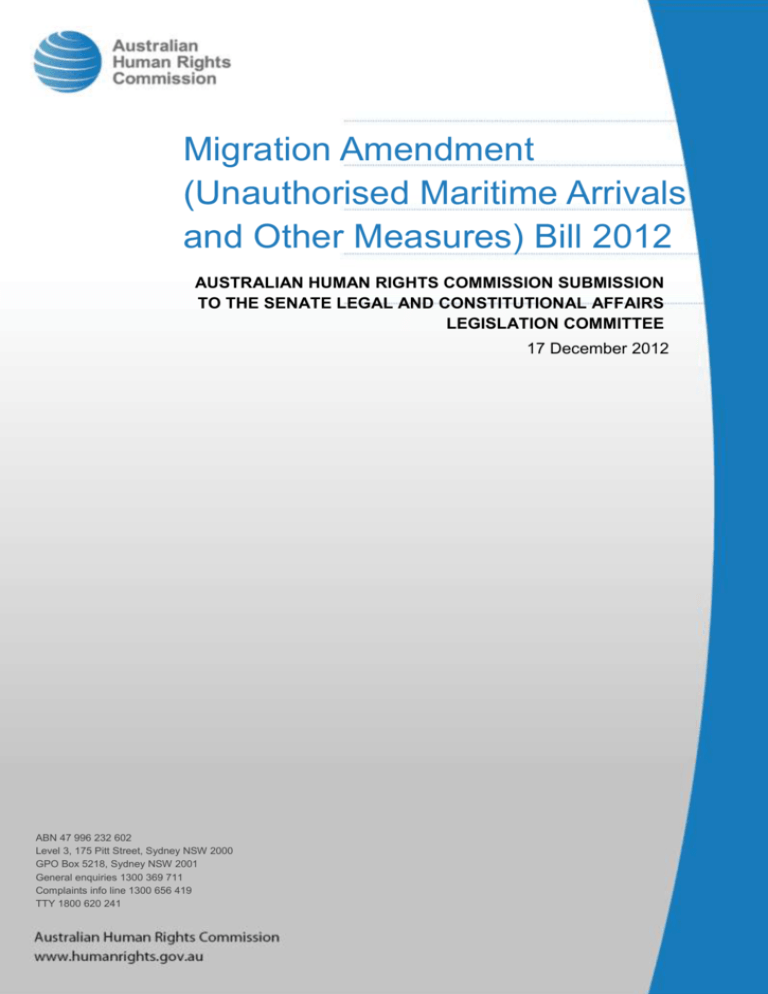
Migration Amendment (Unauthorised Maritime Arrivals and Other Measures) Bill 2012 AUSTRALIAN HUMAN RIGHTS COMMISSION SUBMISSION TO THE SENATE LEGAL AND CONSTITUTIONAL AFFAIRS LEGISLATION COMMITTEE 17 December 2012 ABN 47 996 232 602 Level 3, 175 Pitt Street, Sydney NSW 2000 GPO Box 5218, Sydney NSW 2001 General enquiries 1300 369 711 Complaints info line 1300 656 419 TTY 1800 620 241 Australian Human Rights Commission Migration Amendment (Unauthorised Maritime Arrivals and Other Measures) Bill 2012 – December 2012 Table of Contents 1 Introduction .................................................................................................... 3 2 Summary ........................................................................................................ 3 3 Recommendations ......................................................................................... 4 4 Effect of the proposed amendments ............................................................ 4 5 Analysis of the Bill’s Statement of Compatibility ....................................... 6 5.1 Right to equal protection of the law and non-discrimination .................... 6 5.2 Risk of arbitrary detention and inhumane conditions of detention........... 7 5.3 Risk of cruel, inhuman or degrading treatment or punishment ................ 8 5.4 Risk of violations of rights relating to children and families ..................... 8 6 Relevant rights and obligations under the Refugees Convention............. 9 6.1 Prohibition on penalising asylum seekers for unauthorised arrival ......... 9 6.2 Prohibition on expulsion or return (‘refoulement’) ................................... 10 2 Australian Human Rights Commission Migration Amendment (Unauthorised Maritime Arrivals and Other Measures) Bill 2012 – December 2012 1 Introduction 1. The Australian Human Rights Commission makes this submission to the Senate Legal and Constitutional Affairs Legislation Committee (the Committee) in its Inquiry into the Migration Amendment (Unauthorised Maritime Arrivals and Other Measures) Bill 2012 (Cth) (the Bill). 2. The effect of the Bill would be to extend the system of third country processing (introduced by the Migration Legislation Amendment (Regional Processing and Other Measures) Act 2012 (Cth) (the Regional Processing Act) to all asylum seekers who arrive by boat in Australia without 'authorisation’ (that is, without a valid visa). 3. Over the last decade the Commission has undertaken extensive work in the area of Australian law, policy and practice relating to asylum seekers, refugees and immigration detention.1 The Commission’s work in this area has highlighted the risk of breaches of Australia’s human rights obligations created by the transfer of asylum seekers to third countries for the processing of their claims for protection.2 This submission draws upon that body of work. 4. The Commission notes that the Parliamentary Joint Committee on Human Rights has commenced an examination of the human rights issues raised by the Regional Processing Act and related bills and instruments, including the Bill the subject of this present inquiry. The Commission intends to take the opportunity to provide a holistic response to the human rights concerns raised by the Regional Processing Act and the related bills and legislative instruments. The Commission recommends that the Committee have regard to the results of this examination, as the Commission is of the view that the human rights implications of the present Bill cannot be fully understood in isolation from a broader understanding and analysis of the entire system set up by the Regional Processing Act. 5. In the present submission, the Commission largely confines itself to commenting on the human rights concerns arising out of the provisions of the Bill, through analysis of the Bill’s Statement of Compatibility. 2 6. Summary The Bill if passed will have the effect of: extending the scope of the third country processing regime to asylum seekers who arrive without authorisation at the Australian mainland by boat providing that ‘transitory persons’ can be returned to a designated ‘regional processing country’ even if recognised as a refugee including an express Ministerial power to vary or revoke a determination that a person is exempt from transfer to a third country, if it is deemed to be in the public interest to do so. 3 Australian Human Rights Commission Migration Amendment (Unauthorised Maritime Arrivals and Other Measures) Bill 2012 – December 2012 7. 3 The focus of the Commission’s analysis in the present submission is the impact of the Bill in terms of subjecting a new category of people to the existing scheme for the transfer of asylum seekers to designated third countries for processing of their claims for protection. The Commission is concerned that in doing this the Bill risks breaching numerous rights and obligations, including: the right to equal protection of the law and non-discrimination3 the right to liberty and security (including freedom from arbitrary detention)4 the right to humane treatment while detained5 the right to be free from torture and cruel, inhuman or degrading treatment6 rights relating to children and families7 the obligation not to penalise asylum seekers for unauthorised arrival 8 the obligation not to expel or return asylum seekers to countries where their life or freedom would be threatened.9 Recommendations 8. Recommendation 1: The Commission recommends that the Bill not be passed. 9. Recommendation 2: The Commission recommends that the Committee postpone reporting on the Bill in order to consider the report of the Parliamentary Joint Committee on Human Rights in relation to the Migration Legislation Amendment (Regional Processing and Other Measures) Act 2012 (Cth) and related bills and legislative instruments. 4 Effect of the proposed amendments 10. On 18 August 2012, the Regional Processing Act commenced. Those amendments allow the Minister for Immigration and Citizenship to designate a country as a ‘regional processing country’ to which asylum seekers who have arrived in Australia’s ‘excised offshore territory’ on or after 13 August 2012 will be sent for the processing of their protection claims. 11. The Minister for Immigration and Citizenship, The Hon Chris Bowen MP, has since designated Nauru and Papua New Guinea as ‘regional processing countries’. The Australian Government has since commenced transferring asylum seekers from Australia to Nauru and to Manus Island in Papua New Guinea. 12. The Bill seeks to give effect to recommendation 14 of the report of the Expert Panel on Asylum Seekers.10 If the Bill is passed, asylum seekers who reach the Australian mainland by boat without authorisation will have the same status under domestic law as those who arrive at an ‘excised offshore place’, unless they are an excluded class or otherwise exempted. The result will be 4 Australian Human Rights Commission Migration Amendment (Unauthorised Maritime Arrivals and Other Measures) Bill 2012 – December 2012 that all asylum seekers who arrive in Australia by boat without authorisation (referred to in the Bill as ‘unauthorised maritime arrivals’), unless excluded or exempted: cannot make a valid application for a visa in Australia unless the Minister personally thinks it is in the public interest that they be permitted to do so are to be taken to a designated third country processing country for the processing of their claims for protection. 13. The Bill would delete the term ‘offshore entry person’ from the Migration Act 1958 (Cth) (the Migration Act), and insert the new term ‘unauthorised maritime arrival’. The Bill will provide that a person is an unauthorised maritime arrival ‘if they entered Australia by sea at an excised offshore place at any time after the excision time for that place, or at any other place at any time on or after commencement, became an unlawful non-citizen because of that entry and is not an excluded maritime arrival’.11 14. The Bill will also amend the term ‘transitory person’ in the Migration Act so that a person who has been brought to Australia from a third country for a temporary purpose, such as medical treatment, can be returned to the third country even if they have already been recognised as a refugee for the purposes of the Convention Relating to the Status of Refugees and its Protocol (Refugees Convention). The Bill will consequently amend the Migration Act so that a ‘transitory person’ cannot seek an assessment of their refugee status from the Refugee Review Tribunal (RRT). 15. The Bill if passed would also amend s 198AE of the Migration Act. Section 198AE provides the Minister with discretion to exempt a person from transfer to a third country for processing if the Minister thinks it is in the public interest to do so. The Bill would insert a new sub-section clarifying the Minister’s power to revoke or vary a previous determination to exempt a person if he or she considers it is in the public interest to do so, with the effect that the person would again be liable to be transferred to a third country. 16. The Commission recognises the importance of effective border management and recognises that Australia has a right as a sovereign State to exclude noncitizens from its territory. However, Australia also has international obligations in relation to asylum seekers who come to Australia, including those who arrive by boat, which must be observed in its border management practices. These obligations are set out in the international human rights treaties with which Australia has agreed to comply, including: the International Covenant on Civil and Political Rights (ICCPR) the Convention on the Rights of the Child (CRC) the Convention Against Torture (CAT) 17. The Commission’s view is that the Statement of Compatibility which has been issued in relation to the Bill (the Statement) fails adequately to reflect the 5 Australian Human Rights Commission Migration Amendment (Unauthorised Maritime Arrivals and Other Measures) Bill 2012 – December 2012 extent to which many of the human rights contained in the above-mentioned international instruments are engaged by the Bill. 5 Analysis of the Bill’s Statement of Compatibility 5.1 Right to equal protection of the law and non-discrimination 18. The UN Human Rights Committee (UNHRC) has emphasised that all ‘aliens’ (that is, non-citizens, including asylum seekers) are entitled to the protection of the right to equality and non-discrimination in article 26 of the ICCPR.12 The Commission notes that the Statement fails to identify that article 26 is engaged by the Bill. 19. Article 26 of the ICCPR provides: All persons are equal before the law and are entitled without any discrimination to the equal protection of the law. In this respect, the law shall prohibit any discrimination and guarantee to all persons equal and effective protection against discrimination on any ground such as race, colour, sex, language, religion, political or other opinion, national or social origin, property, birth or other status. 20. The reference in article 26 to ‘equal protection of the law’ ‘without any discrimination’ translates into a requirement that States not discriminate in their laws, whether those laws affect rights protected by the ICCPR, rights in other human rights instruments or any other legal duties or rights.13 The UNHRC has interpreted the terms ‘discrimination’ and ‘other status’ in article 26 very broadly, and in such a way that it effectively does not limit the type of differential treatment which may fall foul of article 26.14 The UNHRC has specifically recognised that laws which distinguish between different categories of aliens engage article 26.15 21. However, the UNHRC has held that a differentiation of treatment will not constitute discrimination within the meaning of article 26 ‘if the criteria for such differentiation are reasonable and objective and if the aim is to achieve a purpose which is legitimate under the Covenant.’16 22. As mentioned above, the Bill constitutes the latest step in a series of amendments to the Migration Act and legislative instruments which collectively establish a scheme for third country processing of asylum seekers’ claims. This scheme is solely directed at asylum seekers who arrive unauthorised in Australia (including, if the Bill is passed, the mainland) by boat. 23. The effect of this system is to prevent asylum seekers who arrive unauthorised by boat from making a valid application for a visa in Australia, and to transfer them to a designated ‘regional processing country’ for the processing of their claims. Asylum seekers who arrive (whether authorised or not) by plane can make an application for a visa and have their claims processed onshore under Australian law, with access to independent merits and judicial review. 24. Accordingly, in order to discharge its obligations under article 26, the Australian Government must justify denying unauthorised boat arrivals access to the Australian system of processing of protection claims, including all the 6 Australian Human Rights Commission Migration Amendment (Unauthorised Maritime Arrivals and Other Measures) Bill 2012 – December 2012 reviews and safeguards contained in that system, when that system is accessible to asylum seekers who arrive by other means (that is, by air). 25. The Government has defined the problem which it is seeking to address by creating the third country processing regime as ‘people smuggling, and its undesirable consequences including the resulting loss of life at sea’.17 The ‘solution’ adopted by the Government is to completely alter the system for processing asylum seekers’ claims for protection, based on mode of arrival. The rationale for this response is that it may change the thinking of asylum seekers as to whether to board an unsafe boat to Australia,18 and (consequently) to engage a people smuggler for this purpose. The impact of the Regional Processing Act and the Bill on people smugglers is, therefore, only indirect. 26. The Commission agrees that preventing the loss of the lives of asylum seekers through drowning at sea is a legitimate purpose under the ICCPR, particularly in light of article 6 which protects the right to life. 27. However, to the extent that the aim of the Government’s differential treatment of maritime asylum seekers is said to be prevention of loss of life, the Commission is concerned that the measures adopted by the Government are not a ‘reasonable’ response to this problem for the purposes of article 26. 28. The impact of the Government’s response extends far beyond addressing the immediate risk to the safety of certain asylum seekers at sea on unsafe boats. The creation of a system of third country processing of claims for protection raised by asylum seekers arriving to Australia by boat creates significant risks of violations of numerous rights under the ICCPR and other international instruments (as discussed below). Accordingly, the Commission’s view is that there is a real question whether the Government’s differential treatment of asylum seekers who arrive (unauthorised) by boat, in terms of subjecting them to a system of third country processing, can be said to be reasonable, and therefore avoid violating article 26 of the ICCPR. 5.2 Risk of arbitrary detention and inhumane conditions of detention 29. The Statement fails to identify that the provisions of the Bill which extend the system of third country processing to asylum seekers who arrive unauthorised by boat to the Australian mainland engage articles 9 and 10 of the ICCPR. Article 9 of the ICCPR provides that no one shall be subjected to arbitrary detention, and article 10 provides that all persons who are deprived of their liberty ‘shall be treated with humanity and respect for the inherent dignity of the human person’. 30. The Commission has previously set out its concerns that people transferred to third countries for the processing of their protection claims may be subject to conditions in those third countries which amount to detention, and in fact arbitrary detention.19 The Commission has also expressed concern that the existing conditions in Nauru may also breach article 10 of the ICCPR.20 7 Australian Human Rights Commission Migration Amendment (Unauthorised Maritime Arrivals and Other Measures) Bill 2012 – December 2012 31. 5.3 As the Bill would subject a further group of people (those who arrive unauthorised by boat to the mainland) to transfer to third countries for the processing of their protection claims, it raises the risk of violations of the rights of those people under articles 9 and 10. The fact that the violations may physically occur on the territory of a third country does not absolve Australia of responsibility for those violations. The UNHRC has stated that a State party may be responsible for extra-territorial violations of the Covenant if its actions are ‘a link in the causal chain that would make possible violations in another jurisdiction’.21 If a ‘necessary and foreseeable’ consequence of Australia’s transfer of persons to Nauru and PNG for processing is the risk of violations of articles 9 and 10 in those countries, Australia will be in breach of its obligations under the ICCPR.22 Risk of cruel, inhuman or degrading treatment or punishment 32. The Statement correctly sets out that under articles 6 and 7 of the ICCPR, and article 3 of the CAT, Australia has an obligation not to send a person to a country where they are at risk of, inter alia, torture or cruel, inhuman or degrading treatment or punishment. However, the Statement contains the erroneous conclusion that because ‘the provisions in the Bill only contemplate increasing the [existing third country processing] scheme to those people who arrive directly at the Australian mainland’, the Bill does not engage these obligations. 33. It is the Commission’s view that the fact that the Bill would subject a new group of asylum seekers to the third country processing scheme set up by the Regional Processing Act and associated instruments means that the Bill itself does engage the rights which are potentially violated by that scheme. 34. The Commission has previously noted the devastating impact that long-term detention can have on the physical and mental health of asylum seekers, as evidenced by the experiences of asylum seekers who were detained in Nauru and Papua New Guinea when these facilities were last used.23 35. In the context of Australia’s obligations under article 7 of the ICCPR not to expose persons to cruel, inhuman or degrading treatment, the Commission notes the finding by the UNHRC in C v Australia.24 In relation to that communication the UNHRC concluded that the continued detention of the complainant in immigration detention (in total for over two years) when Australia was aware that his detention was contributing to his development of a psychiatric illness constituted a violation of article 7 of the ICCPR.25 Given the demonstrated risk to mental (and physical) health posed by long-term detention (mentioned above), the Commission’s view is that the third country processing scheme which is extended by the Bill raises the very real prospect of violations of article 7 of the ICCPR. 5.4 36. Risk of violations of rights relating to children and families The Statement correctly identifies that Australia has an obligation: 8 Australian Human Rights Commission Migration Amendment (Unauthorised Maritime Arrivals and Other Measures) Bill 2012 – December 2012 to treat the best interests of the child as a primary consideration in all actions concerning children (article 3 of the CRC) to refrain from unlawfully or arbitrarily interfering with the family (articles 17 and 23 of the ICCPR). 37. However, the Statement again fails to reflect the fact that the Bill engages these obligations because it has the potential to bring more children and members of families into the third country processing scheme. 38. The Statement also does not recognise that the operation of the third country processing scheme engages a number of other obligations which Australia owes under the CRC, including the obligations to ensure that: 6 39. 6.1 unaccompanied children are provided with special protection and assistance (article 20) applications for family reunification are dealt with in a positive, humane and expeditious manner (article 10) child asylum seekers receive appropriate protection and humanitarian assistance (article 22) children are detained only as a measure of last resort, and for the shortest appropriate period of time (article 37(b)).26 Relevant rights and obligations under the Refugees Convention The Commission notes that as the Refugees Convention is not listed in s 3 of the Human Rights (Parliamentary Scrutiny) Act 2011 (Cth), there is no obligation under that Act to include analysis of how a Bill engages Australia’s obligations under that Convention in the Statement. However, the Commission considers that the full human rights impact of the Bill cannot be considered in the absence of reference to the Refugees Convention. The Convention contains obligations which are binding on Australia, and it has been (partially) implemented by provisions in the Migration Act.27 Prohibition on penalising asylum seekers for unauthorised arrival 40. Article 31 of the Refugees Convention prohibits States Parties from penalising asylum seekers on account of their unauthorised arrival in a country when they are coming directly from a territory where their life or freedom was threatened. Giving ‘penalty’ its plain meaning, article 31 ‘denies governments the right to subject refugees to any detriment for reasons of their unauthorized entry or presence in the asylum country’.28 41. As mentioned above, the effect of the Bill is to deny those asylum seekers who, without authorisation, reach mainland Australia, access to the Australian system of processing of protection claims, and instead subject them to a third country processing system which places them at risk of multiple human rights 9 Australian Human Rights Commission Migration Amendment (Unauthorised Maritime Arrivals and Other Measures) Bill 2012 – December 2012 violations (as discussed above). The Commission is concerned that this is inconsistent with Australia’s obligations under article 31. Prohibition on expulsion or return (‘refoulement’) 6.2 42. Article 33 of the Refugees Convention provides: No Contracting State shall expel or return (‘refouler’) a refugee in any manner whatsoever to the frontiers of territories where his life or freedom would be threatened on account of his race, religion, nationality, membership of a particular social group or political opinion. 43. In order for States to ensure compliance with article 33, it is necessary for any State proposing to remove an asylum seeker to another country to undertake an effective assessment as to whether the person will actually be safe from persecution in that county.29 As the Commission has previously explained: The transfer of asylum seekers to a third country creates a situation in which Australia’s non-refoulement obligations apply to any potential removal of the transferred persons from that third country. In other words, Australia is placing itself in a position in which it relies on third countries to comply with the nonrefoulement obligations that are in fact owed to asylum seekers by Australia.30 44. As the Commission has discussed, it shares the concerns of the UN High Commissioner for Refugees that the systems which currently exist in Nauru and PNG may contain inadequate safeguards, which give rise to the risk that refugees will be returned from those countries to a situation where their life or freedom may be threatened.31 45. As the Bill subjects a further group of persons to transfer and processing in Nauru and PNG, it engages Australia’s obligations under article 33 and raises the risk of their refoulement. 1 2 3 4 5 See Human Rights and Equal Opportunity Commission, A last resort? (National Inquiry into Children in Immigration Detention) (2004), at http://www.humanrights.gov.au/human_rights/children_detention_report/report/index.htm (viewed 5 December 2012); and Human Rights and Equal Opportunity Commission, Those who’ve come across the seas: Detention of unauthorised arrivals (1998), at http://www.humanrights.gov.au/human_rights/immigration/seas.html (viewed 5 December 2012); Australian Human Rights Commission, An age of uncertainty: Inquiry into the treatment of individuals suspected of people smuggling offences who say that they are children (2012), at http://www.humanrights.gov.au/ageassessment/report/index.html (viewed 5 December 2012). The Commission’s submissions on matters relating to asylum seekers are available at http://humanrights.gov.au/legal/submissions/indexsubject.html#refugees (viewed 5 December 2012). See, for example: Australian Human Rights Commission, Human rights issues raised by the transfer of asylum seekers to third countries, Position Paper (November 2012). At http://www.humanrights.gov.au/human_rights/immigration/transfer_third_countries.html (viewed 11 December 2012). International Covenant on Civil and Political Rights, opened for signature 16 December 1966, 999 UNTS 171 (entered into force on 23 March 1976), art 26. International Covenant on Civil and Political Rights, art 9. International Covenant on Civil and Political Rights, art 10. 10 Australian Human Rights Commission Migration Amendment (Unauthorised Maritime Arrivals and Other Measures) Bill 2012 – December 2012 6 7 8 9 10 11 12 13 14 15 16 17 18 19 20 21 22 23 International Covenant on Civil and Political Rights, art 7. International Covenant on Civil and Political Rights, arts 17 and 23; Convention on the Rights of the Child, opened for signature 20 November 1989, 1577 UNTS 3 (entered into force 2 September 1990), arts 3, 10, 20, 22 and 37(b). Convention Relating to the Status of Refugees, opened for signature 28 July 1951, 189 UNTS 150, (entered into force 22 April 1954), art 31 and Protocol Relating to the Status of Refugees, 606 UNTS 267 (entered into force 4 October 1967). Convention Relating to the Status of Refugees, art 33. A Houston, P Aristotle and M L’Estrange, Report of the Expert Panel on Asylum Seekers, Australian Government (2012). At http://expertpanelonasylumseekers.dpmc.gov.au/report (viewed 5 December 2012). The Bill provides that a person is an ‘excluded maritime arrival’ and therefore not an unauthorised maritime arrival if the person is a New Zealand citizen who holds and produces a New Zealand passport that is in force, or is a non-citizen who holds and produces a passport that is in force and is endorsed with an authority to reside indefinitely on Norfolk Island, or is included in a prescribed class of persons: see proposed sub-s 5AA(3). Human Rights Committee, General Comment No. 15: The position of aliens under the Covenant, UN Doc HRI/GEN/1/Rev.9 (Vol. I) (1986), paras 2, 5, 7, 9 and 10. At http://www2.ohchr.org/english/bodies/hrc/comments.htm (viewed 5 December 2012). See also Human Rights Committee, Karakurt v Austria, Communication No. 965/2000, UN Doc CCPR/C/74/D/965/2000 (2002), paras 8.3 and 8.4. At http://www.unhcr.org/refworld/country,,HRC,,AUT,,3f588ef13,0.html (viewed 5 December 2012). M Nowak, U.N. Covenant on Civil and Political Rights: CCPR Commentary (2nd ed, 2005), p 608. See Human Rights Committee, General Comment No.18: Non-discrimination, UN Doc CCPR/C/21/Rev.1/Add. 1 (1989), para 7; M Nowak, U.N. Covenant on Civil and Political Rights: CCPR Commentary (2nd ed, 2005), pp 626-8. Human Rights Committee, Karakurt v Austria, Communication No. 965/2000, UN Doc CCPR/C/74/D/965/2000 (2002), paras 8.3 and 8.4. At http://www.unhcr.org/refworld/country,,HRC,,AUT,,3f588ef13,0.html (viewed 5 December 2012). Human Rights Committee, General Comment No. 18: Non-discrimination, UN Doc CCPR/C/21/Rev.1/Add. 1 (1989), para 13. At http://www.unhcr.org/refworld/publisher,HRC,GENERAL,,453883fa8,0.html (viewed 11 December 2012). Migration Act 1958 (Cth) s 198AA (a). See, for example, the letter written by the Minister for Immigration, the Honourable Chris Bowen MP, on 15 November 2012, which reflects the Government’s view as to the compatibility of the Regional Processing Act with Australia’s human rights obligations, and contains the statement that ‘one of the central objectives underlying the Act…is to prevent children from taking the dangerous boat journey to Australia.’ At http://www.aph.gov.au/Parliamentary_Business/Committees/Senate_Committees?url=humanright s_ctte/activity/migration/min_response.pdf (viewed 11 December 2012). Australian Human Rights Commission, Human rights issues raised by the transfer of asylum seekers to third countries, Position Paper (November 2012), section entitled ‘The detention of asylum seekers in third counties’. At http://www.humanrights.gov.au/human_rights/immigration/transfer_third_countries.html (viewed 11 December 2012). Australian Human Rights Commission, above, section entitled ‘Conditions on Nauru’. See for example Human Rights Committee, Munaf v. Romania, Communication No. 1539/2006, UN Doc CCPR/C/96/D/1539/2006 (2009), para 14.2 (and the jurisprudence cited therein). At http://www.unhcr.org/refworld/publisher,HRC,,ROM,4acf500d2,0.html (viewed 5 December 2012). Human Rights Committee, Munaf v. Romania, Communication No. 1539/2006 UN Doc CCPR/C/96/D/1539/2006 (2009), para 14.2 (and the jurisprudence cited therein). At http://www.unhcr.org/refworld/publisher,HRC,,ROM,4acf500d2,0.html (viewed 5 December 2012). See Australian Human Rights Commission, Submission to the Senate Legal and Constitutional Affairs Committees Inquiry into the Migration Amendment (Health Care for Asylum Seekers) Bill 2012 (October 2012), paras 18-20. At http://www.humanrights.gov.au/legal/submissions/2012/20121025_asylum_health.html (viewed 5 December 2012). 11 Australian Human Rights Commission Migration Amendment (Unauthorised Maritime Arrivals and Other Measures) Bill 2012 – December 2012 24 25 26 27 28 29 30 31 Human Rights Committee, C v Australia, Communication No. 900/1999, UN Doc CCPR/C/76/D/900/1999 (2002). At http://www.unhcr.org/refworld/docid/3f588ef00.html (viewed 5 December 2012). Human Rights Committee, C v Australia, Communication No. 900/1999, UN Doc CCPR/C/76/D/900/1999 (2002), para 8.4. At http://www.unhcr.org/refworld/docid/3f588ef00.html (viewed 5 December 2012). For further discussion on this point, see Australian Human Rights Commission, Human rights issues raised by the transfer of asylum seekers to third countries, Position Paper (November 2012). At http://www.humanrights.gov.au/human_rights/immigration/transfer_third_countries.html (viewed 11 December 2012). See the comments of the High Court in Plaintiff M61/2010E v Commonwealth of Australia; Plaintiff M69 of 2010 v Commonwealth of Australia [2010] HCA 41, [27]; Plaintiff M70/2011 v Minister for Immigration and Citizenship; Plaintiff M106 of 2011 v Minister for Immigration and Citizenship [2011] HCA 32, [90], [98] (Gummow, Hayne, Crennan and Bell JJ); Plaintiff M47-2012 v Director General of Security [2012] HCA 46, [12] (French CJ). J Hathaway, The Rights Of Refugees Under International Law (2005) pp 410-11. J Von Doussa, ‘Human Rights and Offshore Processing’ (2007) 9 UTS Law Review 41, 47. Australian Human Rights Commission, Human rights issues raised by the transfer of asylum seekers to third countries, Position Paper (November 2012), section entitled ‘Refugee status determination processes on Nauru’. At http://www.humanrights.gov.au/human_rights/immigration/transfer_third_countries.html (viewed 11 December 2012). Australian Human Rights Commission, above, sections entitled ‘Designation of PNG as a regional processing country’ and ‘Refugee status determination processes on Nauru’. 12
